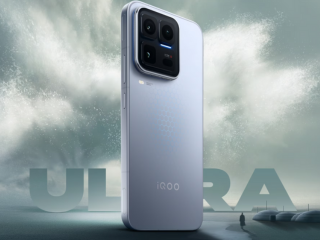- Home
- Mobiles
- Mobiles Reviews
- Vivo V60 Review: Get it for the Cameras
Vivo V60 Review: Get it for the Cameras
The Vivo V60 aims to impress with its stellar cameras. But does it prove to be a good all-round package? Find out in our review.

The Vivo V60 price in India starts at Rs. 36,999 for the base variant
Vivo, along with many other China-based original equipment manufacturers (OEMs), has been pushing the boundaries of mobile photography. In recent years, handsets such as the Vivo X200 Pro (review) and the Vivo X Fold 3 (review) have proven that you don't need an expensive professional camera to take amazing photos. A big credit for this also goes to Zeiss, whose continued partnership with Vivo has been highly fruitful for the brand. To aid its ambition of bringing exceptional mobile photography to the mid-range segment, Vivo launched the new Vivo V60 earlier this month.
The Vivo V60 price in India starts at Rs. 36,999 for the base variant, which comes with 8GB of RAM and 128GB of storage. The handset continues the legacy of being primarily a camera-centric offering, inherited from its predecessor, the Vivo V50, which was introduced almost six months ago. However, there is more to a phone than just cameras. So, is it worth the upgrade?
Vivo V60 Design: Style meets substance
- Dimensions - 163.53×76.96×7.65 mm (Auspicious Gold) Weight - 200g
- Colours - Auspicious Gold, Mist Grey, and Moonlit Blue
- Ingress rating - IP68 + IP69
As we noted in our first impressions of the Vivo V60, it carries forward the same slim and rounded design of the Vivo V50 with one key exception — the camera module. It now resembles the optics unit we saw at the back of the Vivo X200 FE, featuring a vertically placed camera island in the top-left corner. This change improves the handset's appeal, and it certainly looks more upmarket from the back.
We received the Auspicious Gold variant of the Vivo V60, and by no means would you call it a head-turner. However, that's not necessarily a bad thing, especially for those who dislike ostentatious finishes. It is a muted shade of gold with a slight hint of Rose Gold, which I think looks subtle yet premium. Vivo has taken a step further and colour-matched the camera unit to the phone's chassis, which is a nice touch and exudes a more cohesive appearance.
![]()
Vivo V60's camera island resembles the unit on the Vivo X200 FE
The rear panel also houses the Aura Light, which doubles as a flash, along with a third camera sensor placed outside the vertical camera island. You'll find the Vivo branding towards the bottom left corner. You also get a speaker grille, SIM slot, microphone, and the USB Type-C port at the bottom, while power and volume buttons are placed on the right side. The left side of the frame is left clean. The handset also carries an IP68 + IP69 rating, making it resistant to dust, immersion in water, and high-pressure water jets.
The Vivo V60 is quite sleek, with the Auspicious Gold variant measuring 7.65mm. The handset weighs 200g, which, although it is a considerable amount on paper, does not ruin the ergonomics due to curved edges and decent weight distribution. And if you don't feel confident enough due to its slim profile, you can always add a colour-matched case, which comes in the box.
Vivo V60 Display: Decent for the price
- Size and resolution - 6.77-inch full HD+ Quad-Curved AMOLED, 1,080 x 2,392 pixels
- Refresh rate - 120Hz
- Protection - Diamond Shield Glass
The Vivo V60 features a 6.77-inch full HD+ (1,080 x 2,392 pixels) quad-curved AMOLED screen with a 120Hz refresh rate and a peak brightness of 5,000 nits. The display features minimal bezels and is also curved at the edges, which enhances the illusion of a bezel-less display. However, such a large screen real estate means that people with average-sized hands, including myself, might struggle to reach the notification drawer on occasion.
The display looks sharp and bright at all times. I watched content on streaming apps such as Amazon Prime, Netflix, and YouTube, and it produced vibrant colours with deep black levels and good dynamic range. The legibility also remains good, even when looking at content under direct sunlight.
![]()
The handset's display has good legibility for outdoor usage
You can choose from three refresh rate modes on the Vivo V60: Smart Switch, Standard (60Hz), and High (120Hz). The first option automatically adjusts the refresh rate based on the usage scenario and power consumption. It also ensures that you get a smooth scrolling experience in apps and on social media.
All in all, the Vivo V60's display is good for media consumption, and you'll have no complaints on this front.
However, one gripe is with the built-in fingerprint scanner, which is placed too low compared to the conventional placement you see on other phones. While unlocking the phone, your thumb almost touches the bottom portion of the frame. Thus, it may take you some time to get used to it.
Vivo V60 Software: Better but with bloatware
- Software - FuntouchOS 15
- Version - Android 15
- Updates Promised - 4 Years of OS updates and 6 years of security patches
The Vivo V60 runs on Android 15-based FuntouchOS 15 out of the box. The brand has promised four years of operating system updates and six years of security patches on the handset.
It is not your stock Android experience, and there is still a bit of bloatware present. Fortunately, you can choose not to install these apps from the setup screen, eliminating the hassle of manually removing them afterwards. Then, you also have Vivo's own Albums, Store, Browser, iManager, and VStore, which serve as an alternative to Google's suite of apps.
![]()
Vivo V60 comes with a promise of four years of OS upgrades
I was also disappointed to see bloatware apps such as Block Blast, Bubble Shooter, Tile Explorer, and StockGro on a handset that costs over Rs. 35,000. At this price point, brands like Nothing are offering a near-stock Android-level experience. Thus, Vivo could have done better on this front.
Although the aforementioned gripes about the bloatware are indeed worth noting, the software experience on the Vivo V60 remains fluid. There is hardly any lag, with fluid navigation across apps and the user interface. FuntouchOS 15 on the Vivo V60 is also feature-rich. Floating windows and a smart sidebar are two features I liked, while the split-screen view was also useful on more than one occasion.
Vivo has equipped the phone with a plethora of artificial intelligence (AI) features. For calls, you get AI Captions, AI Smart Call Assistant, AI Summary, AI Transcript, and more. There are also camera-centric additions, including AI Reflection Erase, AI Erase, and AI Photo Enhance, among others. One feature I really liked is the AI Image Expander. It analyses the content and structure in images to extend their edges. Another cool addition is the AI Four Season Portrait. Using AI, it can turn your photo into snapshots from different seasons, such as with cherry blossoms, snow, and sunlight.
Vivo V60 Performance: Blazing fast (for the price)
- Processor - Qualcomm Snapdragon 7 Gen 4
- Memory - Up to 12GB LPDDR4X
- Storage - Up to 512GB UFS 2.2
The Vivo V60 is powered by Qualcomm's Snapdragon 7 Gen 4 SoC. This is a really pleasing change compared to the Snapdragon 7 Gen 3 chipset, which powered the last THREE generations of the Vivo V-Series. It is a reasonably capable processor that delivers lag-free performance during everyday tasks. You will have no complaints while taking calls, sending messages, browsing social media, or taking constant photos.
However, it is not a gaming-centric offering by any means, although I managed to run games such as Battlegrounds Mobile India (BGMI) and Call of Duty Mobile for an hour without the handset overheating significantly. There were also minimal frame drops and stutters. Below are some synthetic benchmark scores of the Vivo V60 for your reference:
![]()
Synthetic benchmark scores of the Vivo V60
Vivo has equipped the V60 with up to 16GB of LPDDR4X RAM and up to 512GB of UFS 2.2 onboard storage. The latter is a concerning inclusion as it is a crucial factor that determines the handset's data reading and writing speeds—notably, Vivo's sub-Rs. The 10,000 T4 Lite 5G also features UFS 2.2 storage. Thus, seeing the same technology used on a sub-Rs. 40,000 smartphones are disappointing. Apart from this, another disappointing feature on the Vivo V60 is its speaker. When playing music, there is only treble, which makes it difficult to discern the lyrics or the bass.
Vivo V60 Cameras: Your point and shoot option
- Rear - 50-megapixel primary (f/1.88) + 50-megapixel telephoto (f/2.65) + 8-megapixel ultra-wide-angle (f/2.0)
- Front - 50-megapixel (f/2.0)
The Vivo V60 is an outstanding handset not just in the world of mobile photography, but also in photography in general. It carries the front and rear camera systems that we saw on the Vivo X200 FE. To begin with, you have a 50-megapixel primary sensor, which captures excellent images in daylight. They are bright, sharp, and well-detailed. Shadows are handled well, too. The handset manages the dynamic range well, and the colours appear punchy, but do not feel oversaturated and unnatural. Skin tones are realistic, neither feeling softened nor oversharpened.
Top to bottom: 1X vs 2X vs 3X vs 10X daylight samples (tap to expand)
The Vivo V60 offers up to 10x zoom, although you will start to see the images lose their sharpness and detail at the highest magnification level. The results are also similar in low-light photography. I noticed a slight loss of detail and some noise creeping in, but this was mostly the case when shooting in extremely dimly lit scenarios. Furthermore, zoomed-in shots taken at night do not always come out well.
Top to bottom: 1X vs 3X vs 10X low-light camera samples (tap to expand)
That said, the telephoto lens is the USP of the Vivo V60. It produces better portraits than I ever managed to capture on my iPhone 15 Pro. While the sensor is the same as the one on the X200 FE, Vivo has provided even more flexibility this time around, offering five focal lengths: 23mm, 35mm, 50mm, 85mm, and 100mm.
Up to 85mm, the edge detection is superb, and there is great separation between the subject and the background. This is all done while maintaining the pre-selected colour tones. Apart from this, you also get various Zeiss-tuned bokeh effects, including Biotar, Distagon, Cine Flare, Planar, and Sonnar, which further enhance images with DSLR-style portrait effects. And the results are great.
Some portrait camera samples at different focal lengths, with and without Zeiss filters applied (tap to expand)
Meanwhile, the 8-megapixel ultra-wide-angle shooter isn't the best out of the three. When compared to the primary lens, it produces slightly muted colours. And while barrel distortion is kept at bay, you will notice a slight loss in detail and sharpness.
Some more daylight camera samples (tap to expand)
The camera UI provides a wide array of options, although it can feel overwhelming to someone who is a first-time Vivo user. I spent a good hour digging through the exhaustive list of colour modes, bokeh effects, and personalised styles to get familiar with it. These options appear in the camera viewfinder's bottom-right corner.
The selfie camera on the Vivo V60 also performs well and is on par with what its competitors offer. Photos have plenty of detail, and portraits have decent foreground and background separation.
Top to bottom: daylight vs low-light selfie camera samples (tap to expand)
The Vivo V60 supports 4K video recording at 30fps on both the front and rear cameras. While clips have good detail and dynamic range, the optical image stabilisation (OIS) isn't the best. On more than one occasion, I shot footage while commuting in a car, and it appeared shaky. One good video-centric feature, however, is a vlog mode. As the name suggests, it allows you to shoot a wedding vlog while automatically applying filters and edits to make it ready for sharing on social media.
Vivo V60 Battery: Impressive
- Battery Capacity - 6,500mAh
- Wired Charging - 90W
- Charger - 90W (Included in Box)
Battery life on the Vivo V60 is impressive. It has a 6,500mAh battery that can last you almost a day and a half with normal usage. You might even be able to stretch it to two days if you're a casual user. Charging speeds are good, too.![]()
A 90W charger is included in the box, which can charge the handset from 0 to 100 percent in under one hour. However, there is no wireless charging provided here.
Vivo V60 Verdict
The Vivo V60 arrives as a compelling contender in the mid-range segment. It excels in its camera capabilities, which are enhanced by great Zeiss-tuned portraits, and the results are on par with those of handsets in a segment above. Beyond photography, the phone has a vibrant display with good legibility and an excellent battery life that charges quickly.
However, there are also some trade-offs. To begin with, you get only UFS 2.2 storage, which means slower read and write speeds. Furthermore, there is also some bloatware. So, should you buy the Vivo V60?
If a good camera is what you're searching for in a phone, then look no further than the Vivo V60. However, if an all-around stock Android experience or fast storage is equally important, consider the OnePlus 13R (review) and the Realme GT 7T (review), which are more than capable alternatives.
Get your daily dose of tech news, reviews, and insights, in under 80 characters on Gadgets 360 Turbo. Connect with fellow tech lovers on our Forum. Follow us on X, Facebook, WhatsApp, Threads and Google News for instant updates. Catch all the action on our YouTube channel.
Related Stories
- Samsung Galaxy Unpacked 2025
- ChatGPT
- Redmi Note 14 Pro+
- iPhone 16
- Apple Vision Pro
- Oneplus 12
- OnePlus Nord CE 3 Lite 5G
- iPhone 13
- Xiaomi 14 Pro
- Oppo Find N3
- Tecno Spark Go (2023)
- Realme V30
- Best Phones Under 25000
- Samsung Galaxy S24 Series
- Cryptocurrency
- iQoo 12
- Samsung Galaxy S24 Ultra
- Giottus
- Samsung Galaxy Z Flip 5
- Apple 'Scary Fast'
- Housefull 5
- GoPro Hero 12 Black Review
- Invincible Season 2
- JioGlass
- HD Ready TV
- Laptop Under 50000
- Smartwatch Under 10000
- Latest Mobile Phones
- Compare Phones
- iQOO 15 Ultra
- OPPO A6v 5G
- OPPO A6i+ 5G
- Realme 16 5G
- Redmi Turbo 5
- Redmi Turbo 5 Max
- Moto G77
- Moto G67
- Asus Vivobook 16
- Asus Vivobook S16 (2026)
- Black Shark Gaming Tablet
- Lenovo Idea Tab Plus
- HMD Watch P1
- HMD Watch X1
- Haier H5E Series
- Acerpure Nitro Z Series 100-inch QLED TV
- Asus ROG Ally
- Nintendo Switch Lite
- Haier 1.6 Ton 5 Star Inverter Split AC (HSU19G-MZAID5BN-INV)
- Haier 1.6 Ton 5 Star Inverter Split AC (HSU19G-MZAIM5BN-INV)

















